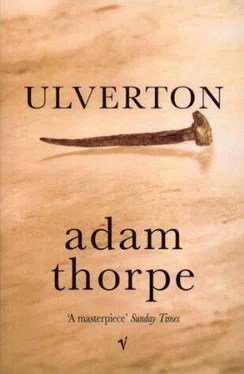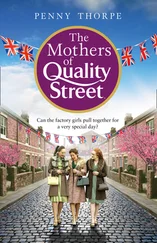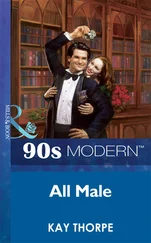He allus called us lads, right up to five year ago, though I were long past thretty year even in ’75, when this happened.
That was his way, see.
An we looks at each other, an makes a face all the same, for them stairs weren’t all we were at then, no — we were doin stalls for Barr’s farm, an nigh on a hundred cogs for the mill, an a fence round what Chalmers’d enclosed (for that were jus begun then, that poor business) an all the littler jobs folk brought in on the chance, like — an here be old Abraham pilin more on, like we were donkeys, past all puttin up with, in our minds.
Now Abraham, we knows, has a patchy temper, so we don’t say nothin, but goes on hammerin, an fixin, an smoothin, then ater work the next day it be off to our shop an in there till eleven, makin gates an doors to Abraham’s lines, by candlelight, though it were well nigh summer, an off to Stiff’s early over Mapleash, an I hangs the big gate into the Gore, as be on the main road just afore turnin off to farm, an there I be fresh up with tom-tit an buntin, a-hangin the big gate, when who should I see but Abraham come. An I turns to the lads an says, ‘What he be up to now then, checkin up, like? He looks bucksome enough.’ More nor we were, hammerin an stompin the earth hard agin the post fit to bust that early we barely nodded a-nights, an the sun only jus now peeped, an mist all along river, see, down the bottom. Aye aye.
You’ll see my gate, off to Oxford, from the saddle, right hand goin out. You’ll see her. Biggest gate I ever done. All chamfered for lightness, nice ripplin jowl, brace o’ best oak an thick as they come. Swings like the gate o’ Heaven for a infant, easy an wide an wi’ ne’er a squeal. An old Ben Bowsher hissed out some fancy wings at the forge for that one, for he knowed it were big an special. All splayed they are, an you’ll see the twirliest bit of iron ever twisted for the top o’ the catch, he were that keen. But a gate be ten hours’ work to the hour, an no messin. So where do we find them hours? Not down in the ale-house. Not here. Not a-snug wi’ my old woman neither. No. Every night, aye, an we weren’t on no spree if we weren’t a-home. No. We was in that shop, boots on the cobbles, an no splut from arn on us, acause we were a-feared, I’ll be frank, o’ that Abraham.
Aye.
He allus called me lad, right to his last breath. An me long past my sixtieth year! Aye. That were his manner. That were his way.
Aye.
I reckons as she oughta be bungin back the spile on this bugger. Air’s been at it. I’ll have another, though. Make sure she fills it slick to the top, no halves.
Thank ’ee.
I were younger then, surely. When I hangs that gate I be fit an hale, but no lad all the same. Now I be bad in the fingers I be a genneman till my dying day. Like your good self, sir. Nowt to go at, now. Aye.
Thy health, sir.
That Abraham.
Listen. He come up to us that mornin an he stands there a-straddle, an sucks at his teeth, an swipes the grass wi’ his stick, an nods summat, an he says, ‘Lads, thee’ll be comin along ship-shape there, I won’t deny it. But thee be summat gingerly wi’ that old creature of a gate. I’d expected thee to be up an away up to Manor by this hour. Thee’ll be havin sup wi’ the maids soon, at this rate.’ An one o’ the lads, a lump of a chap, he be linin up the harr agin the post, readyin it for the hammerin to true, when all on a sudden he stops stock still, an looks upperds, like a hare that’s heared summat, and stays so, while I be waitin for him wi’ my hammer hangin in the air, see, an the peewits makin a hell on a din, an the other lad stampin his boot down about the post as one ought, for a good hold, when Abraham says, ‘What be up wi’ thee, Ketchaside’ — for that were the big lad’s name, one o’ the Ketchasides from Maddle Lane — ‘what be up wi’ thee?’
Aye. I can see it all. My memory en’t be ramshackle. No.
An this Ketchaside, he stays like that, like a hare that’s sniffed summat, till I says, ‘Thomas, what thee be up to, then? I can’t be lollin about wi’ my hammer till the cows come. Hitch that old gal true an let’s be gettin up to Manor.’
I was allus behind the master, then.
An the other lad stops his stampin, an we all looks at young Ketchaside, an Abraham bein summat discomfited, like, turns to us an he says, ‘What be up with the old boy? He en’t goin soft in brain-pan, belike?’
An Ketchaside turns slow, see, an he lets go o’ the gate so as it near drops down on my boots, crashin down like, an he says, mortal slow, ‘Master, methinks I sees an angel up there.’ An Abraham, bein a church-goer, whips his head up an eyes the sky like it were rainin angels, though it be still green wi’ dawn, see, an there be I thinkin as how he’d give Ketchaside a good hidin for his cheek — for I knowed Thomas afore, an he’d allus been a original, a rascally kind o’ tongue to him — but no, old Abraham acts all gullible like, wi’ eyes upperds, but only the peewits be circlin an swoopin, hell on a din, so he looks agin at Ketchaside, half-suspicious like, an says, ‘What angel, lad?’
An Ketchaside acts right up, don’t he, an spreads his arms like this, an flaps ’em up an down, an says, ‘She were mortal big, an all golden, an smiles at I wi’ wings wi’ a touch o’ silver, like they be rimed wi’ mornin, master.’
An he plays it up so surely, as Abraham coughs, an spits, an wipes his mouth, an looks upperds agin, agin at Thomas, then at me, an the other boy, an says, ‘We’d best be on our knees, then, lads.’ An so we all sinks down about the gate, as be a-spraddle on the grass, an offers up our thanks to the Lord, an I be awmost bust from gigglin at the rig, as got the right side o’ old Abraham, make no mistake. An he crosses hisself till I thought he’d wrick his wrist, old Abraham.
But we gets to it straight ater, for sure. An stays that night at the Manor, hammerin till eleven, for the Squire be in Bath that week.
That were a ripper, certain sure.
But the next lot were better. This be a deep un. That Sunday, I meets the two lads by luck, like, a-lollin agin the bridge, Bottom Bridge, past Barr’s farm, an we walks up Chalky Lane to’ards Plumm Farm, an out atop Ewe Drop Hill, an anigh the Folly Clump, an that daft hut of her Ladybitch’s, they call a hermitage, as weren’t ramshackle then as ’tis now, an were lived in by Old Surley, as was in the military, an had a head as was agoggle from the wars, see, but she thought him parfit, an a-dressed him in a long white gown, like out o’ the Scriptures — daft, weren’t it? — an out on the ridge by hatch gate we sat us down on a tuffut, an said as we were jus about slick up to here wi’ old Abraham’s ways, an kepin us to eleven for the last week, an no sign o’ let-up, see.
Now I were summat older nor these two lads. My old woman was allus sayin to me as how I were a slow-worm wi’ old Abraham, an didn’t say as I ought to him, but bein past thretty it weren’t so easy for I to find work else, see, an like I’ve said I weren’t no master, though I could do any joinery you axt of I, an no mistake, but it weren’t like Abraham’s, it weren’t toppermost. No.
I’d bin wi’n for past twenty year by ’75, when this went on as I be tellin. An all that time Abraham had never not a snick o’ praise for owt I done. Not even for them two scrolls, as I cut for Squire. No. He were mortal near wi’ his admiration. He were allus larnin I, right to the last day. That be as how he seed it, by my reckonin. Aye. An I knowed as how I weren’t no lean o’ the trade, but no fat jobber neither, but summat betwixt the two — on account, as I sees it, of my hands, bein as they are summat dubby, though I allus had the strength, see, in my arms. I could snap a lop a-two the width o’ thy thigh, make no mistake. But I never had the touch that he had. An he knowed that, see, to be sure.
Читать дальше










